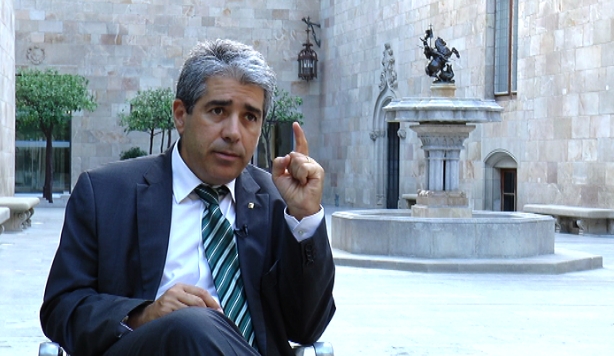09.09.2014 - 14:03
‘This is what we have all agreed, isn’t it? Have we not said and repeated that this is a process that belongs to us all and its strength lies in its whole? Well it is as a whole where the decisions have to be taken in each stage of the process.’ The Minister of the Presidency and government spokesman, Francesc Homs, makes it very clear how the decision will be taken after the foreseeable suspension of the consultation by the Spanish Constitutional Court. In this interview he says that if it were a case of listening to the Constitutional Court, we wouldn’t be where we are now. Most importantly are three things: popular mobilisation, political unity and doing things properly. He says that this is their main commitment and at the same time what makes them most fearful: breaking this unity would mean ‘game over’ for the process of independence.
—Is the government willing to hold the consultation whatever the Constitutional Court says?
—The government is willing to hold the consultation because we have agreed to do it. Once agreed, what we can’t do is to say that the Constitutional Court decides whether we do it. We are convinced that the consultation will be held, simply because there is a legal framework and juridical solvency behind it. If we had paid attention to the Constitutional Court in 2010 when the statute was cut back, we wouldn’t be where we are now. At that time there were also political formations that said that the sentence had to be upheld and that it meant the end of the claims to self-government, but the majority have not followed.
—Don’t you fear about disobeying this court…
—At this point it is not a question of whether we feel fear. The only thing we are committed to is serving Catalonia and trying to do things properly. What would make me fearful, if we have to speak in such terms, would be doing things badly, we can’t afford that. I would be fearful that the unity there is around the consultation and doing it as planned might be broken. I wouldn’t place the other considerations in the realm of fear.
—You have expressed your concern for unity in the commitment to agree on the reply to the Constitutional Court with the remaining parties on the date and the question. If that is so, there doesn’t seem any alternative to getting the urns out on 9-N…
—There is no other way out than to hold the consultation and give the Catalan people a voice…
—On 9 November?
—Obviously. This is what we have all agreed, isn’t it? Have we not said and repeated that this is a process that belongs to us all and its strength lies in its whole? Well it is as a whole where the decisions have to be taken in each stage of the process. Now we are at a point where the great goal is to see whether there is a majority to legitimise independence. This is the great purpose and this is what we have to do in this stage. This is why we agreed to hold the consultation on 9 November.
—Do you plan to create a committee of prestigious international observers for 9-N?
—The vice president of the government of Catalonia has already called for this, but these observers must want to come. The government will send all of the invitations needed and do things to make their work easier. This is what we can do. Whether they come or not depends on them.
—It seems that in Scotland the yes vote for independence might end up on top. What impact will this have on us and on our interests in Europe?
—The Scottish process has already had an impact. They can vote with the agreement of the British government and this has made the Spanish government’s attitude even more obvious. The Scottish mirror has already done its work by showing the difference in democratic attitude between the Spanish and British governments. Obviously if the result finally comes out in favour of independence, one of the things it will be interesting to see is how Mrs Merkel, for instance, takes it. It is obvious that there will be no European leader who can deny the result.
—Apart from the international example, might it favour a decision on independence for those who do not think it is possible?
—The problem, a very large problem, of the Spanish state is that there are political leaders who believe that democracy divides. I think this is the most serious problem. To think that in a democratic context it is necessary to place limits on the expression of popular will seems quite contrary to the logic of democracy. This is the biggest problem of the Spanish state; that democracy is presented as a threat, when it should be quite the opposite.
—This Thursday the V in Barcelona has been called. How should this be useful?
—It is the certification of force, it certifies that the people of Catalonia are behind this process and it is the point of contact in the final stage which is decisive. If there were no powerful mobilisation, just as if there were no political unity, then it would all come to an end. Popular mobilisation and political unity are ‘sine qua non’ conditions. As they said in the games of Martians when we were young, it would be a ‘game over’. It would have finished.



